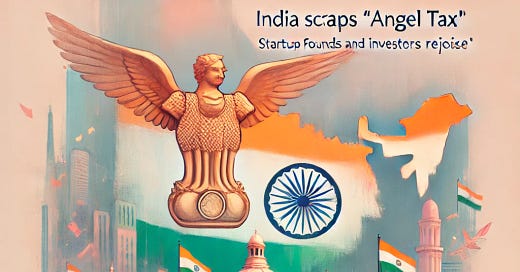India Scraps 'Angel Tax'; Startup Founders and Investors Rejoice
The abolition of the angel tax marks a pivotal moment for the Indian startup ecosystem. It is expected to spur innovation, boost funding for fledgling companies, and create a more favorable climate.
India Scraps 'Angel Tax'
In a significant move to bolster the startup ecosystem, Finance Minister Nirmala Sitharaman announced the abolition of the contentious "angel tax" in the Budget 2024-25. This tax had long been a point of contention for startup founders, angel investors, and venture capitalists (VCs). While the tax was intended to curb money laundering, it ended up stifling the growth of startups by hanging over them like the sword of Damocles. Many found it out of sync with the general startup and Digital India initiatives, which Prime Minister Narendra Modi was personally steering.
What Was the Angel Tax?
The angel tax, formally codified in Section 56(2)(viib) of the Income Tax Act, was introduced by the Finance Act in 2012, in the last Budget presented by then-Finance Minister Pranab Mukherjee, before he resigned to contest for the post of President of India. His successor, P. Chidambaram, often spoke about this being an anachronistic tax provision but could not get it reversed during the UPA government led by Prime Minister Manmohan Singh. Ironically, he’s trying to claim credit for its scrapping in his latest tweet.
The tax was imposed on investments made in unlisted companies, particularly startups, where the investment amount exceeded the fair market value (FMV) of the company's shares. Given the archaic methods of computing the FMV, the angel tax, often referred to as the hated "Jaziya," became an albatross around the necks of not only startup stakeholders but also the income tax administration. The tax aimed to prevent the flow of unaccounted funds into the startup ecosystem by taxing the excess amount as 'income from other sources' in the hands of the startup or its existing shareholders but served no useful purpose except throttling the funding of nascent startups by angel investors and VCs.
Key Issues with Angel Tax
Valuation Challenges: Early-stage investments are often based on future potential rather than current value, making it difficult to justify valuations under the angel tax regime.
Scrutiny and Credibility: The tax led to increased scrutiny of funding sources and investor credibility, especially when the funds were flowing in through entities registered in tax havens across the globe.
Retrospective Application: The retrospective nature of the tax created significant tax liabilities for startups, hindering their growth.
Conversion of Instruments: The tax impacted the conversion of convertible instruments into equity, adding to the complexity and burden on startups.
The Abolition of Angel Tax
In her Budget speech, FM Sitharaman stated, "To bolster the India startup ecosystem, to boost entrepreneurial spirit and support innovation, I propose abolishing angel tax for all classes of investors." This move is expected to provide clarity, avoid unintended consequences on investments, and support the startup ecosystem in India. Experts point out that the existing provisions of the Prevention of Money Laundering Act, 2002, coupled with the laws governing black money and benami properties, are more than adequate to tackle, tax, or attach illicit Indian capital round-tripping into the country through overseas entities.
Impact on the Startup Ecosystem
The abolition of the angel tax is seen as a major step towards creating a more favorable environment for innovation and investment. It addresses a long-standing demand of the startup community for a less restrictive fundraising landscape.
Industry Reactions
The removal of the angel tax has been met with widespread approval from the startup community, as reported in reputed media outlets, including Reuters:
Prashanth Prakash, Accel: "Eliminates a major hurdle, making it easier and more attractive for investors to support early-stage startups."
Adarsh Nahata, PhonePe CFO: "Eradicates a significant compliance burden, attracting investment and fostering an environment where startups can truly thrive."
K Ganesh, Serial Entrepreneur: "For the last 12 years, this has been a major irritant, cause of angst, anguish among angel investors, founders, and the startup ecosystem."
Mitul Mehta, Blume Ventures Finance Head: "Founders and investors will feel more at ease after this change, allowing them to concentrate on building their businesses."
Summing Up
The abolition of the angel tax marks a pivotal moment for the Indian startup ecosystem. It is expected to spur innovation, boost funding for fledgling companies, and create a more favorable environment for investment and growth. With the removal of this tax, startups and investors can now focus on building sustainable businesses without the looming threat of tax-related complications. This single decision, accompanied by the Prime Minister’s package for skilling the youth and the already favorable income tax rates for startups and newly incorporated companies, will be a shot in the arm for young entrepreneurs. If the ease of doing business law, also announced in the budget speech, meets the expectations of entrepreneurs by cutting the proverbial red tape of approvals and clearances, India could well position itself as the favored destination for incorporating new startups in high-tech sectors, especially in the rapidly expanding field of artificial intelligence (AI).




